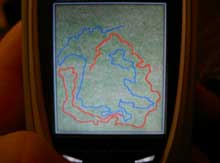 We Make Money Not Art
We Make Money Not Art have an interesting piece on
GPS Tron:
The player's movements in real space, which are tracked by GPS and transmitted to the phone's display, influence his/her position in the game. Each player is represented by a line that gets longer and longer. But the player's own line is never allowed to cross itself or the opponent's line. Which makes the game harder as time passes. The goal is to drive your opponent into a corner so that he can no longer extend his line without breaking the rules and losing. This is a game for two players who can be geographically distant from one another.
The game in itself is interesting, but looking at the image of GPS Tron digitally overlaid onto the cityscape made me realise something:
Tron's light cycle sequence is the perfect expression of Michel de Certeau's notion of spatial resistance. de Certeau argued that top-down structures like the city were
places, but everyday life created/allowed
spaces within the city in which the individual's pathway and choices were not dictated by the system, but were subjectively driven, allowing for resistance against seemingly monolithic structures, rules and systems. Applying de Certeau to contemporary spatial politics can be problematic since de Certeau's writing didn't factor in the digital (which is completely understandable given most of his writing was in the 1970s). However,
Tron shows us spatial resistance within a seemingly closed digital place. The light cycle competition is
supposed to force players to compete with a kill each other. However, when Tron and his companions break out of their designated place, they start to create and traverse digital space. These spaces are created by the players' movement through the digital, but are subjectively enacted, not dictated by the system (or the Master Control Program in
Tron's case).
Tron, the harbinger of computer-generated special effects, also allows us to start imagining modes of resistance via 'the everyday', something increasingly important as the cultural struggles to keep and expand the public domain continue.
 We Make Money Not Art have an interesting piece on GPS Tron:
We Make Money Not Art have an interesting piece on GPS Tron:
















0 Comments:
<< Home